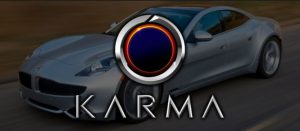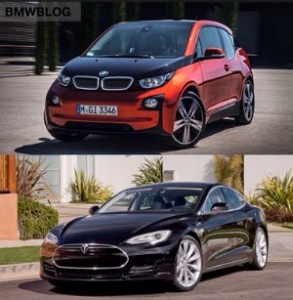 Karma Automotive is transitioning beyond the original Fisker Karma electric-drive system through a new partnership with BMW, using its latest powertrain components. Karma, which recently opened a manufacturing plant in California, plans to begin selling its flagship luxury car late next year that will start with a $115,000 price tag. Owned by Chinese auto parts giant Wanxiang Group, Karma Automotive has contracted with BMW to supply its battery charging system and some of its electric-drive technology.
Karma Automotive is transitioning beyond the original Fisker Karma electric-drive system through a new partnership with BMW, using its latest powertrain components. Karma, which recently opened a manufacturing plant in California, plans to begin selling its flagship luxury car late next year that will start with a $115,000 price tag. Owned by Chinese auto parts giant Wanxiang Group, Karma Automotive has contracted with BMW to supply its battery charging system and some of its electric-drive technology.
Sharing components through automaker alliances has become a common practice in global auto manufacturing in recent years. With BMW’s successful i Series electric drivetrain used in the i3 and i8 models, it was probably inevitable that a partner company entering the luxury electric vehicle space would make an alliance with the German automaker.
For startups like Karma and Tesla Motors, relationships with large, established automakers has been essential for breaking into the capital-intensive, competitive automotive space. Tesla was able to go that route to cut time and cost through acquiring the Lotus chassis for the Tesla Roadster. Tesla also gained investors and corporate clients selling its powertrain components to Toyota and Daimler for their electric vehicles. While the Tesla/Toyota deal is ending, the Japanese automaker’s investment in Tesla, and turning over its old NUMMI plant in Fremont, Calif., to Tesla, were important steps for the startup electric carmaker to survive and move forward.
Karma’s battery will be provided by A123 Systems, a company Wanxiang also purchased out of bankruptcy. A123 was the original supplier to the Fisker Karma, but has developed a new battery for the Karma model coming out late next year. BMW will supply high-voltage battery charging systems and a wide range of hybrid and EV systems.
The year 2012 was devastating for Fisker Automotive and A123 Systems. In January 2012, 239 Fisker Karmas were recalled due to A123 battery defects blamed for causing fires under the hood. In March of that year, Consumer Reports called the Karma “undrivable” from its testing site. The year wrapped up in November with Hurricane Sandy causing a New Jersey port to be flooded, which took out more than 300 Karmas parked there waiting for carrier trucks.
Karma Automotive thinks that the alliance with BMW will lead to other new vehicle announcements, according to Karma Chief Marketing Officer Jim Taylor. One of them will be a battery-electric model. “Carmakers buy parts from other carmakers, especially in expensive areas like powertrain technology. As we launch the vehicle under the new name Karma, using BMW components will be a big help to the brand,” Taylor said.
Karma Automotive will be assembling its cars at its Moreno Valley, Calif., 555,670 square-foot facility. Its headquarters office is located in Costa Mesa, Calif. The company currently has about 300 employees, with about 40 working at the plant.
Chinese automakers are expected to play a vital role in the future of electric vehicles in the U.S. and China. Along with Wanxiang Group bailing out Karma Automotive and A123 Systems, there are several other alliances picking up steam:
- Santa Rosa, Calif.-based three-wheel electric carmaker Zap nearly went out of business until its merger a few years ago with Chinese company Jonway Auto. Dong Feng Motor Corp. expects delivery of at least 3,000 electric vehicle minivans from Zap and Jonway by Dec. 31, 2015. Dong Feng expects its order to increase to at least 2,000 units per months starting in January 2016.
- Faraday Future, owned by Leshi Internet Information and Technology Corp., is developing an electric vehicle to compete with rival Tesla Motors. The start-up is based in Gardena, Calif.
- Atieva Inc., based in Menlo Park, Calif., is also working on a new electric car. That company is also backed by Leshi, as well as by Beijing Automobile Industry Holding Co.
- Coda Automotive, a battery electric carmarker based in California, has gone bankrupt. Coda had partnered with Chinese battery company Lishen, and carried that technology over to its Coda Energy battery energy storage company after Coda Automotive went out of business.
- Chinese automaker BYD, which impressed Warren Buffet’s Berkshire Hathaway enough to bring them in as a major investor, has set up U.S. headquarters in Los Angeles. BYD is lining up contracts to deliver electric buses to transit agencies in the region.

